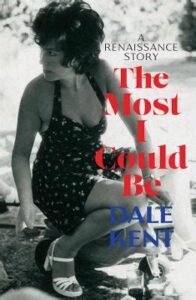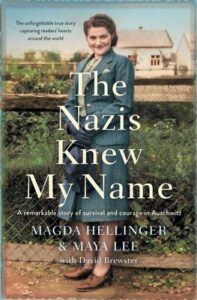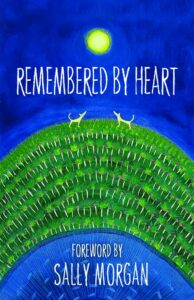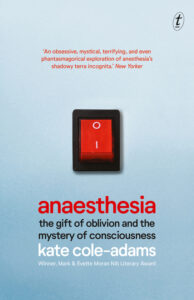What a bumper month! We received fifteen reviews of fourteen books, which is much higher than the number of reviews that we have collected in recent months. Some books that have been featured in round-ups previously were reviewed during September: Cass Moriarty read Yumiko Kadota’s Emotional Female (see her review here), Kate Forsyth reviewed Bri Lee’s Eggshell Skull (review here), Veronica Strachan read Fiona Murphy’s memoir The Shape of Sound (review here), and KTBookBingo featured Dianne O’Brien’s Daughter of the River Country (review and accompanying photo here on Instagram).
September was certainly Memoir/Autobiography month, with eight books published from 1964 up to recent 2021 releases. There was one memoir/history and one biography.
Memoir/Autobiography
The ‘oldest’ memoir/autobiography reviewed during September was Katherine Susannah Prichard’s Child of the Hurricane: An Autobiography, published in 1964. Novelist, poet, playwright, communist and political activist, Prichard was born in 1883 in Fiji (during a hurricane- as referenced in the title) and died in 1969 in Perth. Bill Holloway, in his blog The Australian Legend, found that the book did not answer many of his own questions about what influenced her as a writer.
…for all that KSP is a competent writer [this autobiography] reads like a journalistic colour piece. …You get the impression that KSP …thought her ‘life’ was worth three volumes, and so we make our way easily through becoming a journalist, travelling, working in London, the onset of the War, meeting Hugo Throssell VC and then, all of a sudden, the second and third volumes, marriage, Perth, novels, communism, Hugo’s death, must be packed into a final chapter….An entertaining read, informative about her early years in a chatty way but which left me wishing she’d at least written the second volume, about her middle years and the literary and political theory which informed her writing. (Review here)
 Another memoir from an established writer that left our reviewer somewhat disappointed was The Most I Could Be (2021), written by Australian historian of the Italian Renaissance, Dale Kent. In her review, Janine Rizzetti writes:
Another memoir from an established writer that left our reviewer somewhat disappointed was The Most I Could Be (2021), written by Australian historian of the Italian Renaissance, Dale Kent. In her review, Janine Rizzetti writes:
For me, a memoir is a creative re-construction of a life structured and shaped around a motif. Despite the phrase ‘the most I could be’ which was repeated both as boast and self-exculpation in several places, this is pretty much a start-at-the-beginning-and-go-through-to-the-end sort of autobiography. At the end of the book she says “As a historian, I have kept the record” (p. 406) and this is the way that it read: as an act of recording rather than creating. ….She is laceratingly honest about herself, her sexual neediness, her alcoholism. I was drawn to keep reading the book, but it was almost as if I was reading with my fingers over my eyes, apprehensive over what she was going to do or reveal next. (Review here)
Two of the memoirs read during September were written with the assistance of another person. Magda Hellinger and Maya Lee’s book The Nazis Knew My Name (2021) was based on the memoirs  which Magda had put on paper prior to her death at the age of 89 in a Melbourne nursing home. The memoir was supplemented with research that her daughter, Maya Lee, assisted by David Brewster, undertook in order to fill in the gaps in her mother’s story. In her review, Brenda Telford writes:
which Magda had put on paper prior to her death at the age of 89 in a Melbourne nursing home. The memoir was supplemented with research that her daughter, Maya Lee, assisted by David Brewster, undertook in order to fill in the gaps in her mother’s story. In her review, Brenda Telford writes:
Magda was deported in a cattle truck in March of 1942 to Auschwitz for no other reason than she was a Jew. That was to begin the next three years of her life where she fought to stay alive and fought to keep others alive. …The Nazis Knew My Name is an exceptional rendition of Magda Hellinger’s selfless, caring life and the quite amazing story of her survival, the survival of the man she met in Birkenau who would later become her husband, and the survival – against all odds – of many others. Many, many stories of the Holocaust have been told and this is another; truth, warts and all. (Review here).
Marie Younan’s A Different Kind of Seeing: My Journey (2020) was co-written with teacher Jill Sanguinetti, who met Marie in a Returning to Learning class at the Migrant Women’s Learning Centre. Sue from Whispering Gums writes:
In many ways, Marie Younan’s A different kind of seeing: My journey is a standard memoir about a person overcoming the limitations of her disability which, in this case, is blindness. It’s told first person, chronologically, from her grandparents’ lives through her birth in Syria to the present when she is in her late 60s and living in Melbourne. However, there are aspects of her story which add particular interest, and separate it, in a way, from the crowd. …One of these aspects is that Younan’s story is not only a story about blindness, but about migration and cultural difference….[L]argely through the mentorship of a man called Ben Hewitt (to whom the book is dedicated), she was introduced to various services, organisations and people that resulted in her learning to read; learning Braille; studying psychology and later interpreting; travelling around Victoria speaking on behalf of the Royal Victorian Institute for the Blind; and working as an interpreter, including for refugees…It’s an amazing trajectory – and one told quietly, and with humility and respect for her family and for all who helped her on the way. (Review here)
Sally Morgan’s edited edition Remembered by Heart: An Anthology of Indigenous Writing was published in 2014.  It contains a collection of memoirs that have been abridged for a Young Adult audience from life-writing by a range of Indigenous authors, even though their simplified format and audience is not readily apparent from the book’s cover. Katie writes in her Instagram review:
It contains a collection of memoirs that have been abridged for a Young Adult audience from life-writing by a range of Indigenous authors, even though their simplified format and audience is not readily apparent from the book’s cover. Katie writes in her Instagram review:
Although the marketing of the book leaves a lot to be desired, the memoirs that it contains are anything but. They are powerful, confronting and eyeopening. They all take the reader back to Western Australia between the 1930s and 1960s and expose what life was like for Aboriginal people at this time. …these biographical abridged accounts from longer memoirs detail lives of heartache, sorrow, confusion; but also of hope, pride and the comfort and love that only connection to family and country can bring. I also really liked that each of the fifteen contributors has a small biography at the end of the book so that you can learn more about them.(Review here)
There are two parts to Black and Blue (2021), the memoir written by Gunai/Kurnai woman, Veronica Gorrie. The first part deals with her life before joining the Queensland Police Service, and the second deals with her experience of ten years working in the QPS and beyond. We received two reviews of this book during September.
Jennifer Cameron-Smith writes:
This is a very personal story, of growing up in a society which (to my shame) makes judgements
about people based on colour and ethnicity often without considering culture, family ties and responsibilities. Some people sink beneath the burden of abuse and mistreatment, others will find a path through to achieve a more meaningful life for themselves, but all are scarred by their experiences. (Review here)
In the second review, Kate’s at KT’s Book Bingo notes on Instagram:
A strong Aboriginal woman, she had a childhood that no one would envy and after being subjected to unthinkable domestic violence; Gorrie joined the Queensland Police Service (QPS). …Hoping to change the system from within after a lifetime of watching her family being on the receiving end of the Police, Gorrie had no idea just how entrenched racism and sexism was in the QPS and just how dramatically this would effect her life going forward. …Be aware though, Black and Blue is not for the faint hearted. There is nothing about Gorrie’s life that has been easy and she doesn’t hold back. The writing is raw, emotional and unflinching. She is not backwards in coming forward and with themes of inter generational trauma, family unit breakdown, child neglect, domestic violence, racism, crime, drug and alcohol abuse, sexism, misogyny and corruption; the plot can be heavy going at times. However, to my mind; we need more books like this. We need more survivors telling their stories so that we can take off our rose coloured glasses regarding the failures of so many things as a Nation and put a face to the statistics that we often so easily gloss over as just another number. (Review here)
Another Queensland story of a very different tenor is found in Mary Groves’ An Outback Life (2011), described by the publisher as “one entertaining yarn after the after”. Jennifer Cameron-Smith who reviewed this book  writes:
writes:
In this memoir, first published in 2011, Mary Groves writes of her life in the Top End of Australia. When she was fourteen, Mary and her family moved from Melbourne to the Northern Territory. The family included Mary, her parents and seven of her siblings. ….In a fascinating memoir, which ends in 1999 when Mary moves to Queensland, she tells of the challenges and hardships she and her family faced. In her early 20s, Mary met Joe Groves – a cattleman, horse breaker, drover, and rodeo rider. They fell in love, had four children, and worked together on several different cattle stations across northern Australia. The nature of Joe’s work meant that he and Mary were often separated, and the isolation meant that Mary acquired an array of survival skills. (Review here)
Finally, Kim Forrester@Reading Matters posted her review of My Friend Fox (2021). She writes:
Depression is commonly referred to as the ‘black dog’. In Heidi Everett’s memoir, My Friend Fox, her mental illness is essentially a ‘fox’, a wild, misunderstood animal often viewed as an outsider, a creature of terror and beauty.In this evocative book, illustrated with beautiful line drawings by the author, we learn what it is like to be a resident on a psych ward, where every facet of your life is controlled by rigid medical protocols and unwritten rules….My Friend Fox is quite an astonishing read — short, powerful and fable-like. The depiction of mental illness and the impact it has on one person’s life is arresting and illuminating. And despite the trauma at its heart, this survivor’s tale brims with optimism — and hope. (Review here)
Memoir/history
 As is often the case, some books combine elements of memoir and history. Kate Cole-Adams’ Anaesthesia: The Gift of Oblivion and the Mystery of Consciousness was published in 2017, and has been reviewed by Kate Forsyth:
As is often the case, some books combine elements of memoir and history. Kate Cole-Adams’ Anaesthesia: The Gift of Oblivion and the Mystery of Consciousness was published in 2017, and has been reviewed by Kate Forsyth:
On the one hand it’s an examination of the history of anaesthetics, and some of the mysteries and problems associated with it. To my relief, it was written in such clear, limpid and often lyrical language that I had no problem understanding it. The other aspect of the book was personal histories of those who have suffered and survived and been saved because of anaesthetics, including that of Kate Cole-Adams herself. These stories lifted the book out of the ordinary, along with her utterly beautiful prose… (Review here)
Biography
Our one biography review received during September takes as its subject Dame Enid Muriel Lyons, born in Tasmania in 1897. She met Joseph Aloysius Lyons, then the Labor member for the Tasmanian seat of Windsor, and married him two years later in April 1915, leading to a long political life for them both. In her review of Anne Henderson’s Enid Lyons: Leading Lady to a Nation (2008) Jennifer Cameron-Smith writes:
And so began a partnership, which ended when Joe Lyons, Prime Minister of Australia, died in office on 7 April 1939. Joe and Enid had twelve children, the youngest of whom was born in 1933. Enid and Joe had been effective partners in life and politics: they supported each other. On 21 August 1943, Enid Lyons was elected member for the Tasmanian federal seat of Darwin (now Braddon). She was the first female member of the House of Representatives. …On moral issues Dame Enid was conservative, in keeping with her Catholic faith. Some of her children described her as remote. But it is clear that Dame Enid worked hard, and in her first parliamentary term could take some credit for the extension of child endowment and free medical treatment for pensioners. (Review here)
As always, thank you to our reviewers who share their thoughts and observations with us.
About: I’m Janine Rizzetti and I blog at the immodestly-named Resident Judge of Port Phillip where I indulge my love of reading, podcasts, history and seeing films and exhibitions just before they close. I am a historian, interested in Australian and colonial history. I’m officially retired but more occupied than I thought I would be with my local historical society, playing with grandchildren, learning Spanish and now playing ukulele!





Woo hoo. Always nice to see a bumper crop. And thanks for sharing my review. It’s a story worth sharing. As are several here, though I’m sorry Kent’s book was disappointing.
Wonderful interest review of books that deserve our attention as readers.